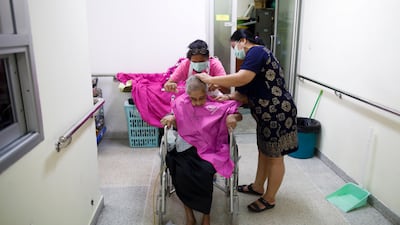The moment it finally hit me was when I stood by the door of the hospital room and looked at the empty bed: Dad was gone.
Every day, I had visited him in the intensive care unit for a month, and before that for a month in the ward. And I was his primary care giver for four years before that. Not to mention the many years prior of being there to give care, even though I didn’t think I was a carer. Caring for Mum was intertwined in those years, too. So, as I stood at the entrance of the hospital room that day, I realised I had lost my identity as a carer. It is an all-consuming role that requires dedication and sacrifice, and you don’t realise how many are doing it till you’re in that situation, round the clock looking after a family member or a friend.
Carers UK reports that in 2021, there were 6.5 million carers in the UK, and every day, 6,000 people become carers, many of whom are unpaid and unrecognised for their work, making an enormous contribution to society and saving the economy billions of pounds. The organisation adds that an estimated 1.4 million people provide over 50 hours of care a week – more hours than a full-time job – which affects their own lives and well-being.
But what happens after caring? A 2023 report by the charity group Carers UK, titled The experiences of former carers, highlights the profound impact of caregiving. My reaction post-bereavement was that the stress I was living in would be reset, now that I was in a seemingly less intense "post-caring" phase of life.
But it was only in reading reports that I found myself nodding along to challenges I hadn’t even recognised. Many former carers can face long-lasting effects on their mental and physical health, sometimes lasting 10 years or more.
In my own experience, the transition from being a full-time carer to suddenly not being one left me feeling lost without a core component of my identity. It left me without a framework I had established for my life and it seemed I was not alone.
The number of carers in the UK is only going to keep growing because by 2035, the number of people aged 85 and over who will need 24-hour care will double, according to a 2018 LSE report published in the medical journal The Lancet. This means we need urgent action and well-considered solutions to support carers, not just during but also after their caregiving roles.
One potential solution is to improve access to respite care during the caregiving period to reduce the build-up of fatigue and the tipping point to burnout. It’s taken me six months simply to realise how exhausted I still am. Respite care provides temporary relief for carers, allowing them to take a break and look after their own health. Feeling like the care work you are doing is valuable makes a difference to being able to do it well. It also helps a carer in the post-caring rationalisation that he or she goes through of understanding what happened during that period.
A 2023 report by the UK’s Carers Trust is starkly titled Unpaid carers are not unsung heroes. We are forgotten, neglected and burnt out. It points to the importance of raising awareness about the importance of caregiving and advocating for better policies. Ed Davey, the leader of the Liberal Democratic Party, has been vocal about his own experiences as a carer: "Caring has been in the shadows far too long. It’s time to shine a light on it."
And then there’s money. Many struggle financially due to the demands of their role. The Carers UK report showed that 39 per cent of carers are in debt as a result of their caregiving responsibilities. In addition to financial support, mental health services for carers must be prioritised.
Accessible mental health services tailored to the needs of carers can provide crucial support and prevent long-term mental health problems.
Anywhere in the world, carers need a system of support – respite care, financial support, and mental health services – and this can’t stop at the moment of bereavement. It needs to be a more tapered approach.
Looking after our loved ones full time is an act of dedication, but it should not come at the expense of a person's well-being. We need to ensure that we care better for those who are caring.

